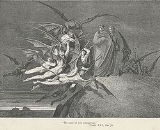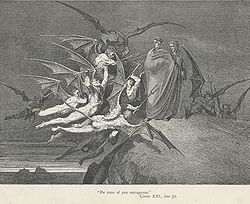
Malacoda
Encyclopedia
Malacoda is a character in Dante Alighieri
's Inferno
, part of the Divine Comedy. He is the leader of the Malebranche
, the nine demons who guard Bolgia Five of Malebolge
, the eighth circle of Hell
. The name Malacoda is roughly equivalent to "bad tail" or "evil tail" in Italian
. Unlike other characters such as Geryon
, which are based on mythical characters, Malacoda was invented by Dante and is not a mythological reference.
 Malacoda is mentioned in Bolgia five in Dante Alighieri
Malacoda is mentioned in Bolgia five in Dante Alighieri
's Inferno. He with his fiends guard
the grafters, caught in boiling pitch to represent their sticky-fingered deals, torturing with grappling hooks whoever they can reach. Dante and Virgil
gain a safe conduct from him (Malacoda) and he allows the poets to cross to the next Bolgia. However, Malacoda lies to the poets about the existence of bridges over the sixth Bolgia, making him less a help and more an impediment. In the Inferno it does not
state whether or not Malacoda chases the poets after his demons Grizzly(Barbariccia) and Hellken(Alichino) fall into the boiling pit of pitch
. All
the Inferno states is that the poets were being chased by the fiends before they escaped by sliding down down a bank to the next
Bolgia. Malacoda and his fiends cannot leave the fifth Bolgia of the grafters. It is said in the Inferno
"For the providence that gave them (the fiends) the fifth pit to govern as the ministers of its will takes from their souls the power of leaving it".
Malacoda also gives the reader the time by telling how long time it was since Bolgia Six passages collapsed;
And then to us: 'You can't continue farther
down this ridge, for the sixth arch
lies broken into pieces at the bottom.
"If you desire to continue on,
then make your way along this rocky ledge.
Nearby's another crag that yields a passage.
"Yesterday, at a time five hours from now,
it was a thousand two hundred sixty-six years
since the road down here was broken.
"I'm sending some men of mine along that way
to see if anyone is out to take the air.
Go with them -- they won't hurt you." (Inferno, Canto XXI, 106-117.)
Dante assumes that the crucifixion of Jesus took place in year 34, when a great earthshake came. It happened 12 o'clock am (midnight). according to the Gospel of Luke
, and that means that the time for Dante would be approxiomately 7 o'clock am in the Holy Saturday
. Dante compares the demons to a Frog who tried to drown a mouse in Asoep.
Dante Alighieri
Durante degli Alighieri, mononymously referred to as Dante , was an Italian poet, prose writer, literary theorist, moral philosopher, and political thinker. He is best known for the monumental epic poem La commedia, later named La divina commedia ...
's Inferno
Inferno (Dante)
Inferno is the first part of Dante Alighieri's 14th-century epic poem Divine Comedy. It is followed by Purgatorio and Paradiso. It is an allegory telling of the journey of Dante through what is largely the medieval concept of Hell, guided by the Roman poet Virgil. In the poem, Hell is depicted as...
, part of the Divine Comedy. He is the leader of the Malebranche
Malebranche (Divine Comedy)
The Malebranche are the demons in the Inferno of Dante's Divine Comedy who guard Bolgia Five of the Eighth Circle . They figure in Cantos XXI, XXII, and XXIII...
, the nine demons who guard Bolgia Five of Malebolge
Malebolge
In Dante Alighieri's Inferno, part of the Divine Comedy, Malebolge is the eighth circle of Hell. Roughly translated from Italian, Malebolge means "evil ditches". Malebolge is a large, funnel-shaped cavern, itself divided into ten concentric circular trenches or ditches. Each trench is called a bolgia...
, the eighth circle of Hell
Hell
In many religious traditions, a hell is a place of suffering and punishment in the afterlife. Religions with a linear divine history often depict hells as endless. Religions with a cyclic history often depict a hell as an intermediary period between incarnations...
. The name Malacoda is roughly equivalent to "bad tail" or "evil tail" in Italian
Italian language
Italian is a Romance language spoken mainly in Europe: Italy, Switzerland, San Marino, Vatican City, by minorities in Malta, Monaco, Croatia, Slovenia, France, Libya, Eritrea, and Somalia, and by immigrant communities in the Americas and Australia...
. Unlike other characters such as Geryon
Geryon
In Greek mythology, Geryon , son of Chrysaor and Callirrhoe and grandson of Medusa, was a fearsome giant who dwelt on the island Erytheia of the mythic Hesperides in the far west of the Mediterranean. A more literal-minded later generation of Greeks associated the region with Tartessos in southern...
, which are based on mythical characters, Malacoda was invented by Dante and is not a mythological reference.

Dante Alighieri
Durante degli Alighieri, mononymously referred to as Dante , was an Italian poet, prose writer, literary theorist, moral philosopher, and political thinker. He is best known for the monumental epic poem La commedia, later named La divina commedia ...
's Inferno. He with his fiends guard
the grafters, caught in boiling pitch to represent their sticky-fingered deals, torturing with grappling hooks whoever they can reach. Dante and Virgil
Virgil
Publius Vergilius Maro, usually called Virgil or Vergil in English , was an ancient Roman poet of the Augustan period. He is known for three major works of Latin literature, the Eclogues , the Georgics, and the epic Aeneid...
gain a safe conduct from him (Malacoda) and he allows the poets to cross to the next Bolgia. However, Malacoda lies to the poets about the existence of bridges over the sixth Bolgia, making him less a help and more an impediment. In the Inferno it does not
state whether or not Malacoda chases the poets after his demons Grizzly(Barbariccia) and Hellken(Alichino) fall into the boiling pit of pitch
Pitch (resin)
Pitch is the name for any of a number of viscoelastic, solid polymers. Pitch can be made from petroleum products or plants. Petroleum-derived pitch is also called bitumen. Pitch produced from plants is also known as resin. Products made from plant resin are also known as rosin.Pitch was...
. All
the Inferno states is that the poets were being chased by the fiends before they escaped by sliding down down a bank to the next
Bolgia. Malacoda and his fiends cannot leave the fifth Bolgia of the grafters. It is said in the Inferno
Inferno (Dante)
Inferno is the first part of Dante Alighieri's 14th-century epic poem Divine Comedy. It is followed by Purgatorio and Paradiso. It is an allegory telling of the journey of Dante through what is largely the medieval concept of Hell, guided by the Roman poet Virgil. In the poem, Hell is depicted as...
"For the providence that gave them (the fiends) the fifth pit to govern as the ministers of its will takes from their souls the power of leaving it".
Malacoda also gives the reader the time by telling how long time it was since Bolgia Six passages collapsed;
And then to us: 'You can't continue farther
down this ridge, for the sixth arch
lies broken into pieces at the bottom.
"If you desire to continue on,
then make your way along this rocky ledge.
Nearby's another crag that yields a passage.
"Yesterday, at a time five hours from now,
it was a thousand two hundred sixty-six years
since the road down here was broken.
"I'm sending some men of mine along that way
to see if anyone is out to take the air.
Go with them -- they won't hurt you." (Inferno, Canto XXI, 106-117.)
Dante assumes that the crucifixion of Jesus took place in year 34, when a great earthshake came. It happened 12 o'clock am (midnight). according to the Gospel of Luke
Gospel of Luke
The Gospel According to Luke , commonly shortened to the Gospel of Luke or simply Luke, is the third and longest of the four canonical Gospels. This synoptic gospel is an account of the life and ministry of Jesus of Nazareth. It details his story from the events of his birth to his Ascension.The...
, and that means that the time for Dante would be approxiomately 7 o'clock am in the Holy Saturday
Holy Saturday
Holy Saturday , sometimes known as Easter Eve or Black Saturday, is the day after Good Friday. It is the day before Easter and the last day of Holy Week in which Christians prepare for Easter...
. Dante compares the demons to a Frog who tried to drown a mouse in Asoep.

